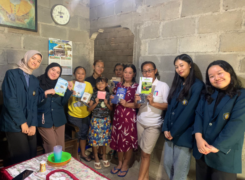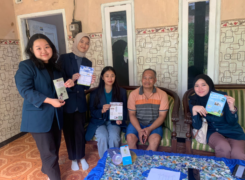The Community Service Programme (KKN) this time introduced innovations in improving milk quality by introducing pasteurisation methods to the residents of Medowo Village, Kandangan District, Kediri Regency, East Java. Medowo Village, located at the northeastern end of Kediri Regency and bordered by Wonosalam, Jombang Regency to the north and Malang Regency to the south, is known for its cool and cold air as it is situated on the slopes of Mount Anjasmoro. This village consists of five hamlets: Sidomulyo, Medowo, Sidorejo, Mulyorejo, and Ringinagung.
With a dairy cattle population of 10,917 in 2022 and nine dairy cooperatives registered with the East Java Livestock Service, milk is the main commodity produced by the residents of Medowo Village. Milk, as a nutrient-rich animal food, is very important in meeting the nutritional needs of the community. The nutritional content of milk includes 66 kcal of calories, 3.2 grams of protein, 3.7 grams of fat, 4.6 grams of lactose, 0.1 milligrams of iron, 120 milligrams of calcium, and 100 IU of vitamin A.
However, the high protein content in milk makes it susceptible to contamination by microorganisms, both pathogenic and non-pathogenic. Pathogenic microorganism contamination can make milk a source of disease, while non-pathogenic contamination can reduce the physical quality of milk, such as causing rancid odour and changes in colour and taste. Therefore, proper handling is necessary to maintain milk quality.
One effective method of maintaining milk quality is the pasteurisation process. According to the Indonesian National Standard (SNI) 01-3951-1995, pasteurised milk is milk that has undergone a heating process at a minimum temperature of 72°C for 15 seconds or 63-66°C for 30 minutes, then cooled to a maximum temperature of 4.4°C and handled aseptically. This process can kill most pathogenic microorganisms, although the spores of pathogenic microorganisms may not be completely eliminated.
The KKN activity carried out in Medowo Village by 5 students guided by Dr. Gretania Residiwati, M. Si., Ph. D., aims to provide socialisation and training on pasteurisation methods to the local community, the majority of whom are dairy farmers. With the knowledge provided, it is hoped that the community can process and store fresh milk better, so that milk quality can improve and milk can last longer.
Through this socialisation, the residents of Medowo Village are expected to be able to apply the pasteurisation method in their daily lives, which will ultimately improve the quality and competitiveness of the milk produced. This activity is expected to provide long-term benefits for the residents of Medowo Village in maintaining their health and well-being through the consumption of quality milk.
Author: Abigail Paramuthia Permadi


